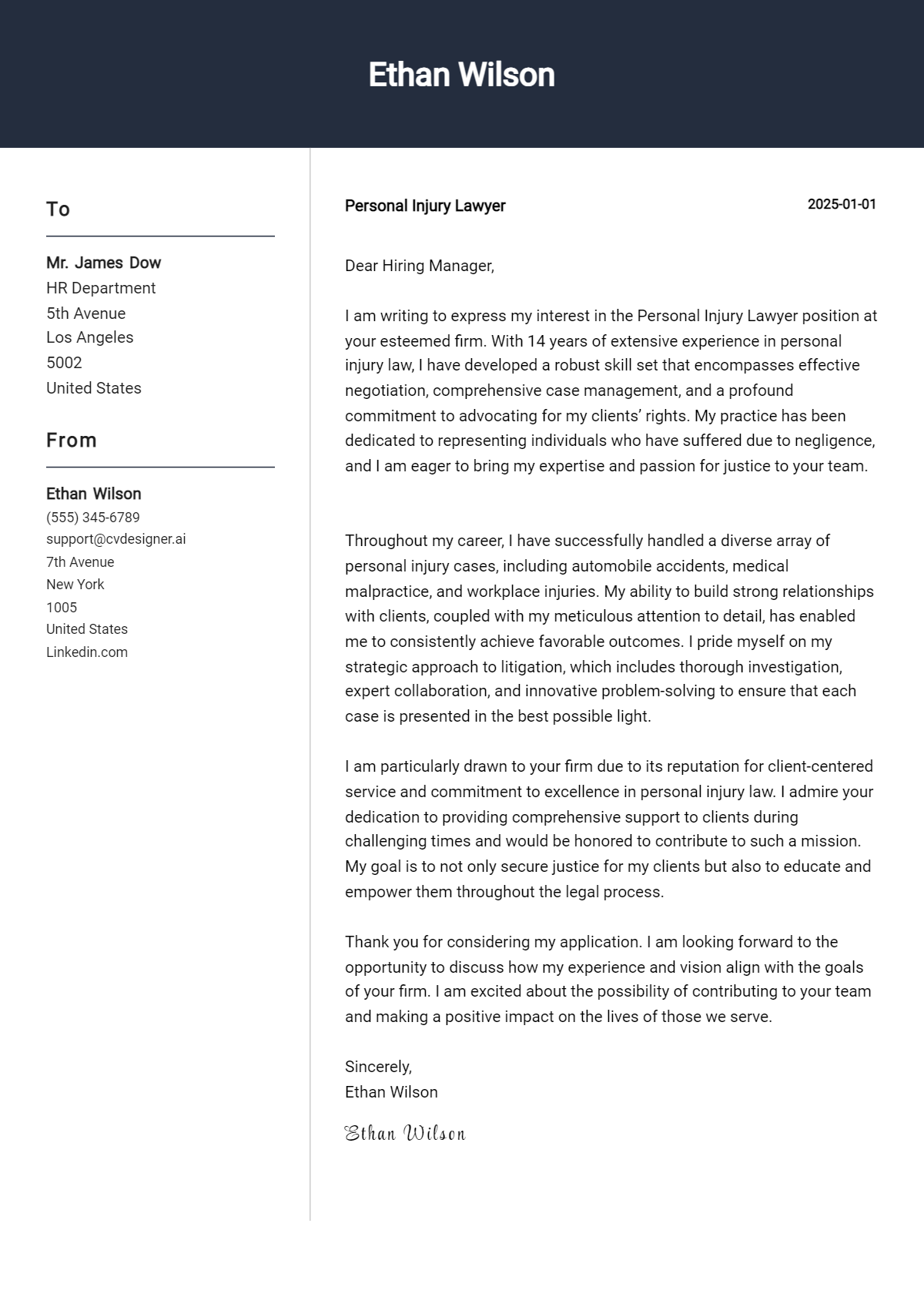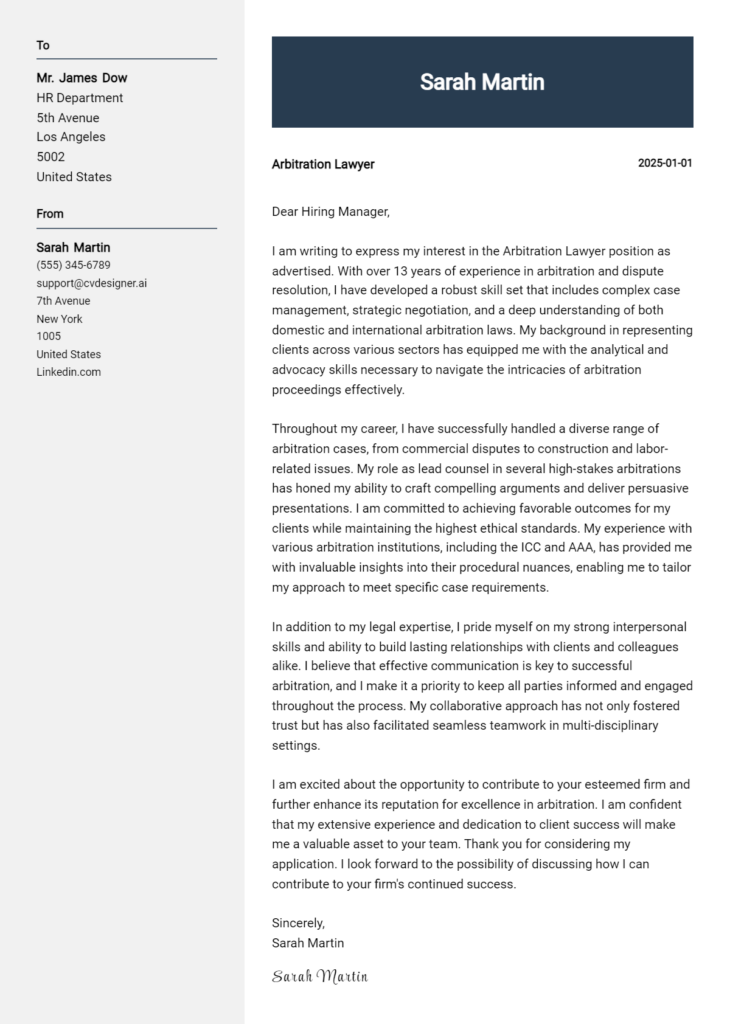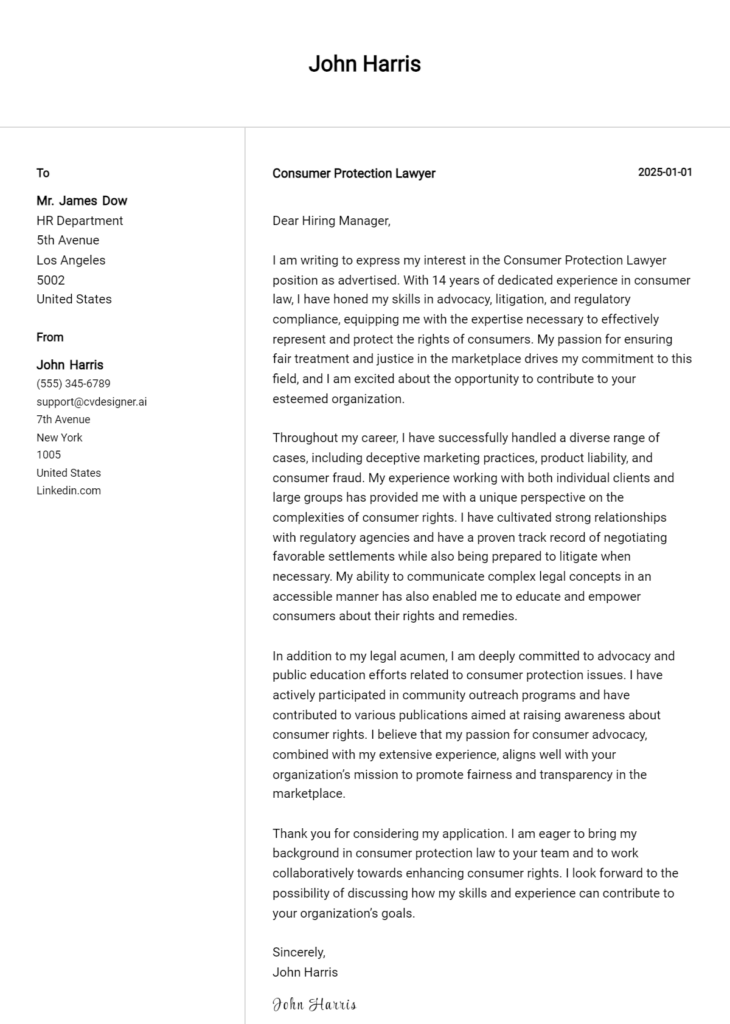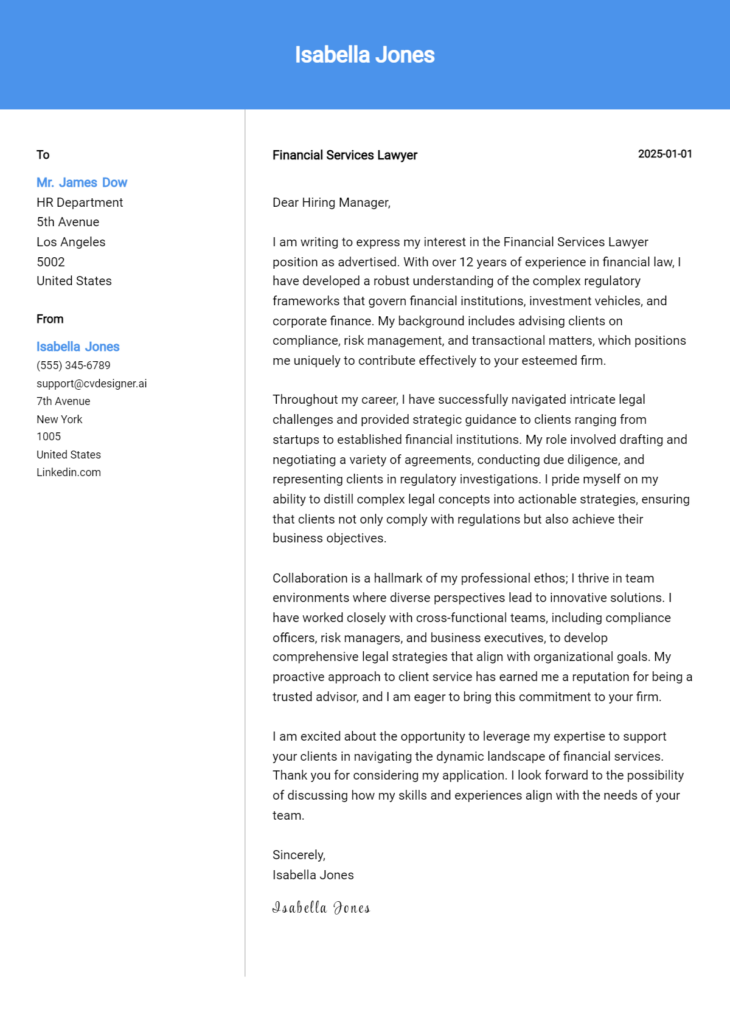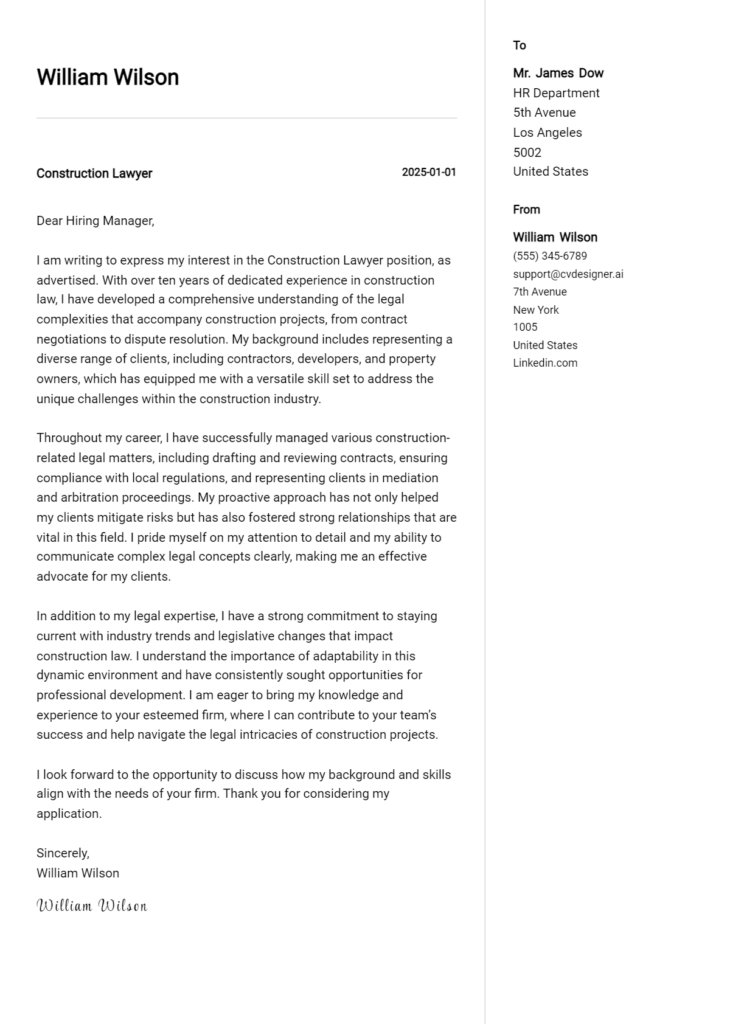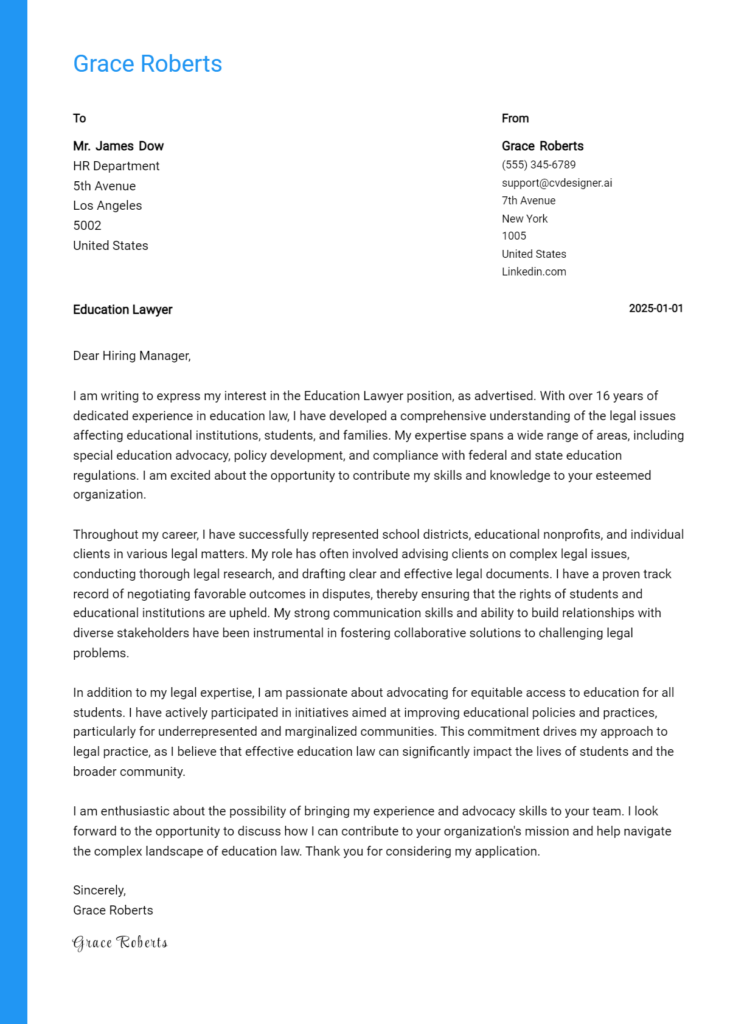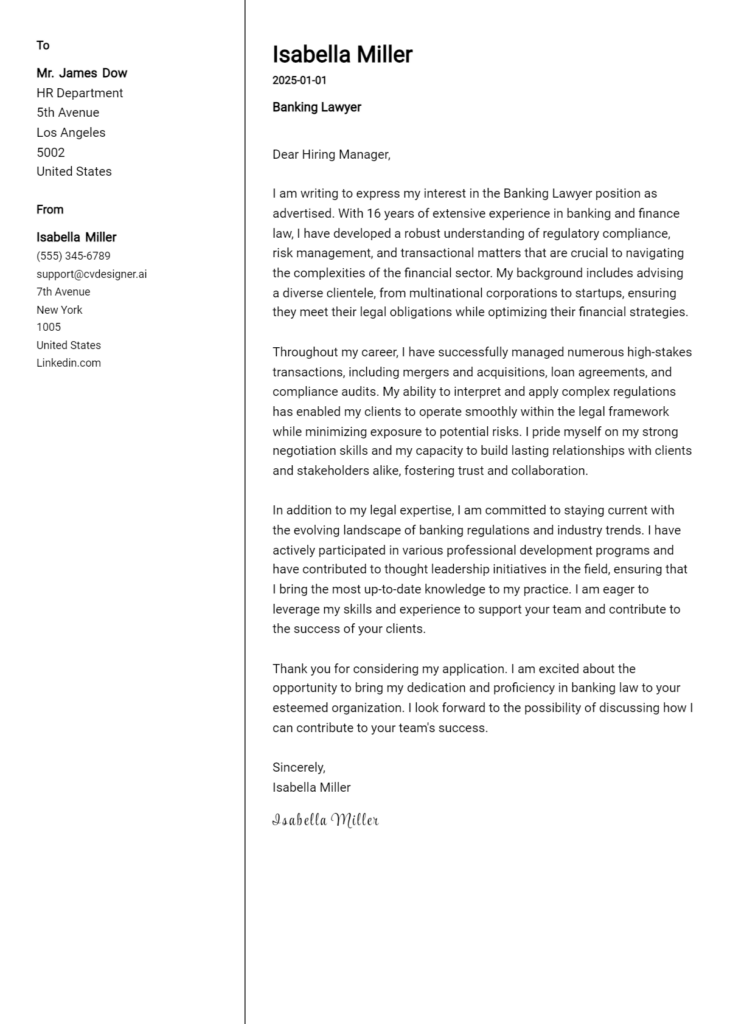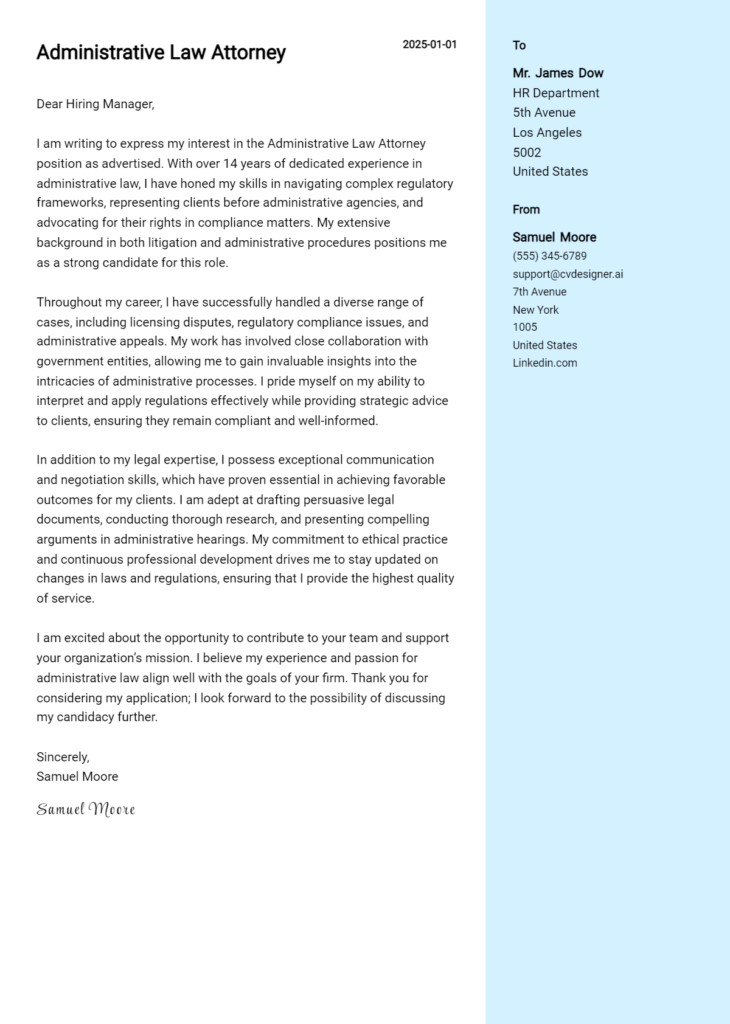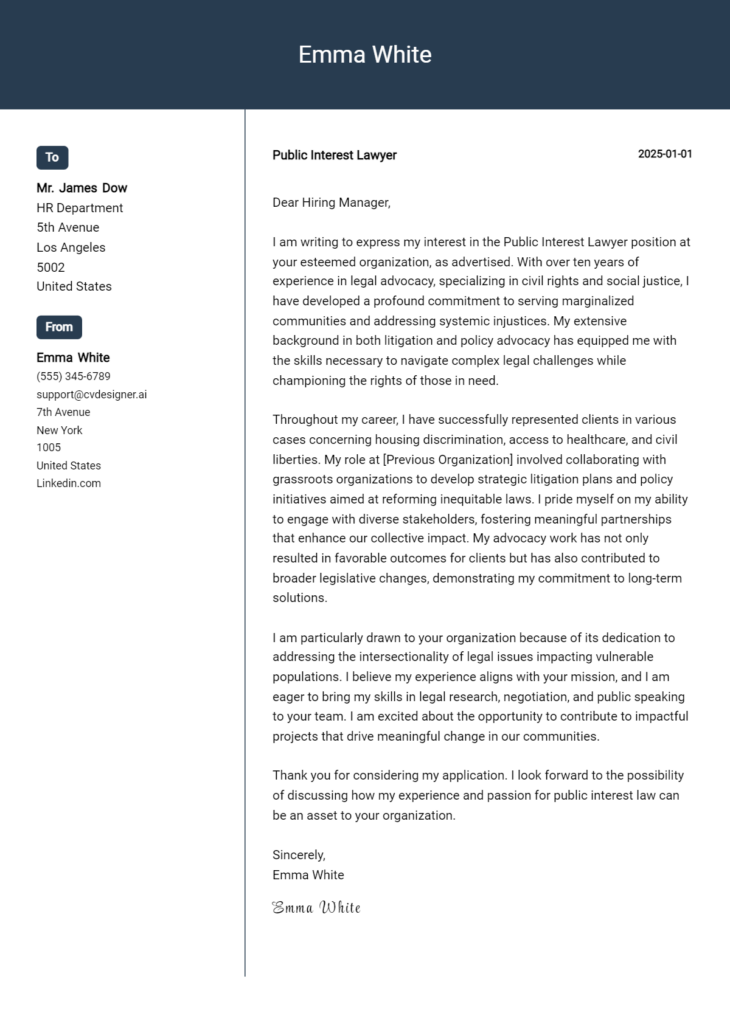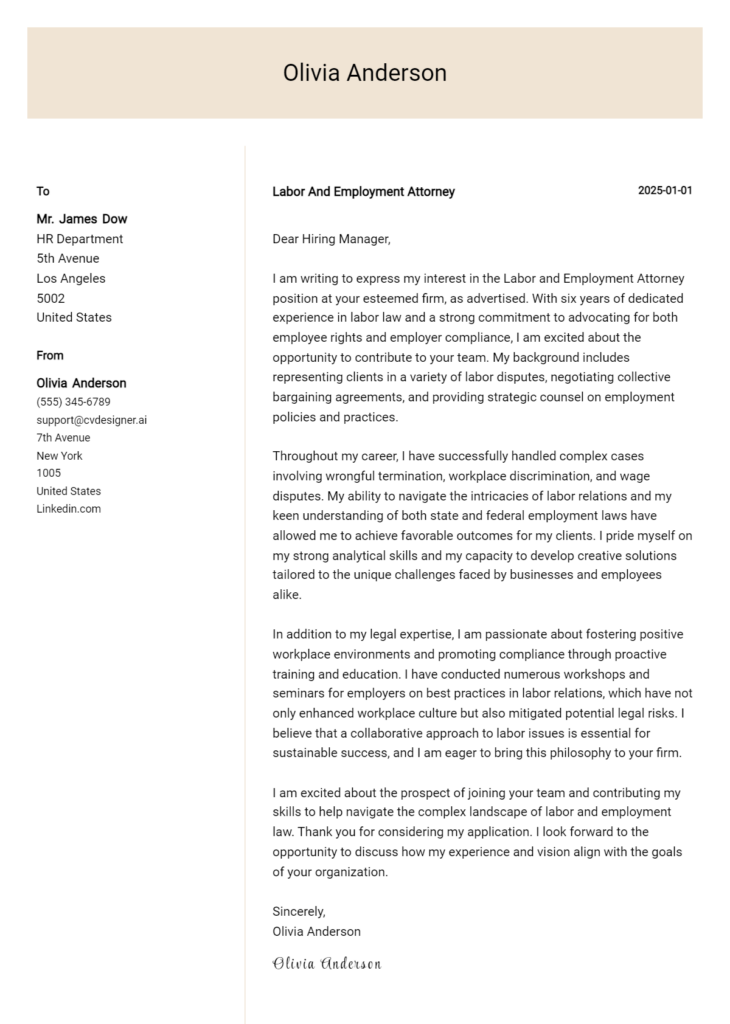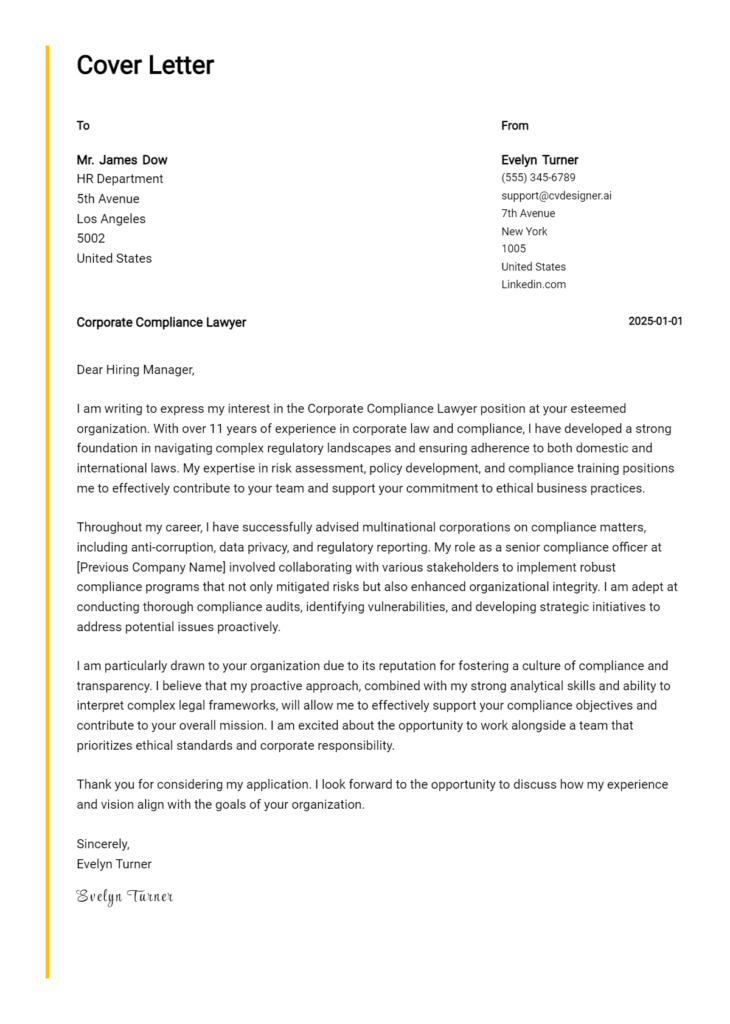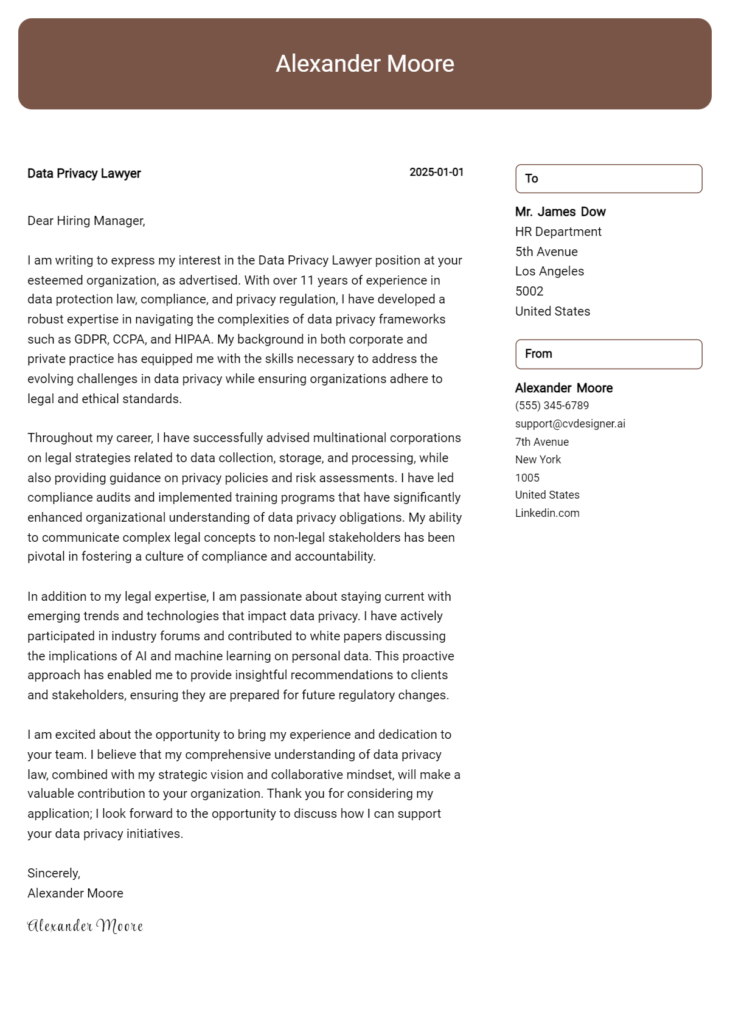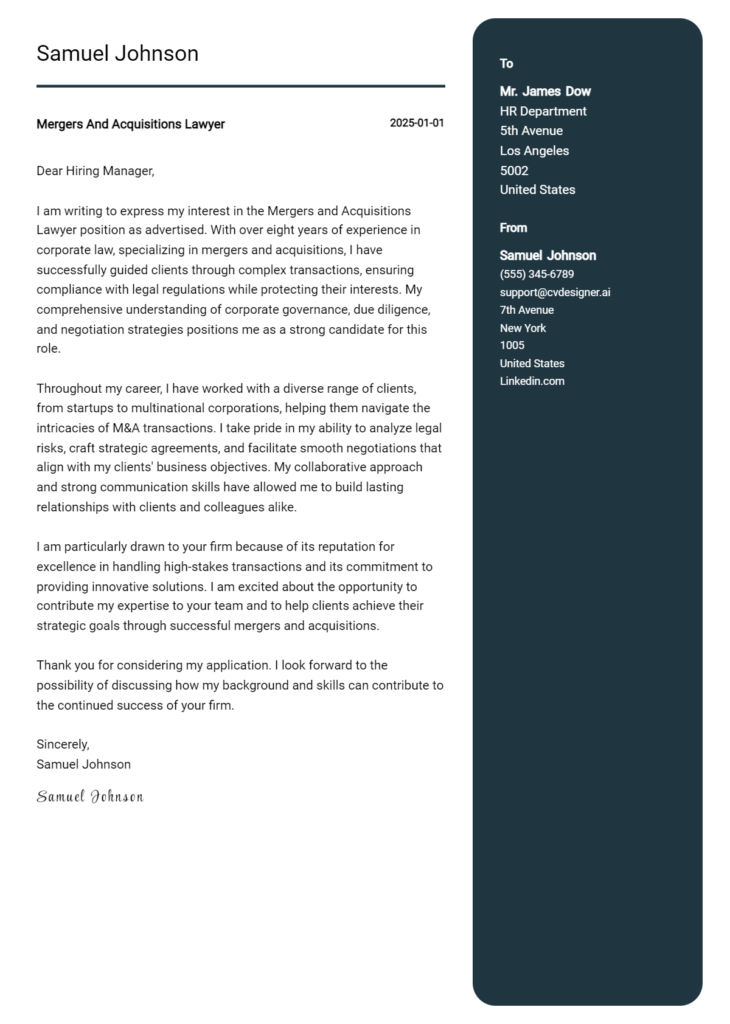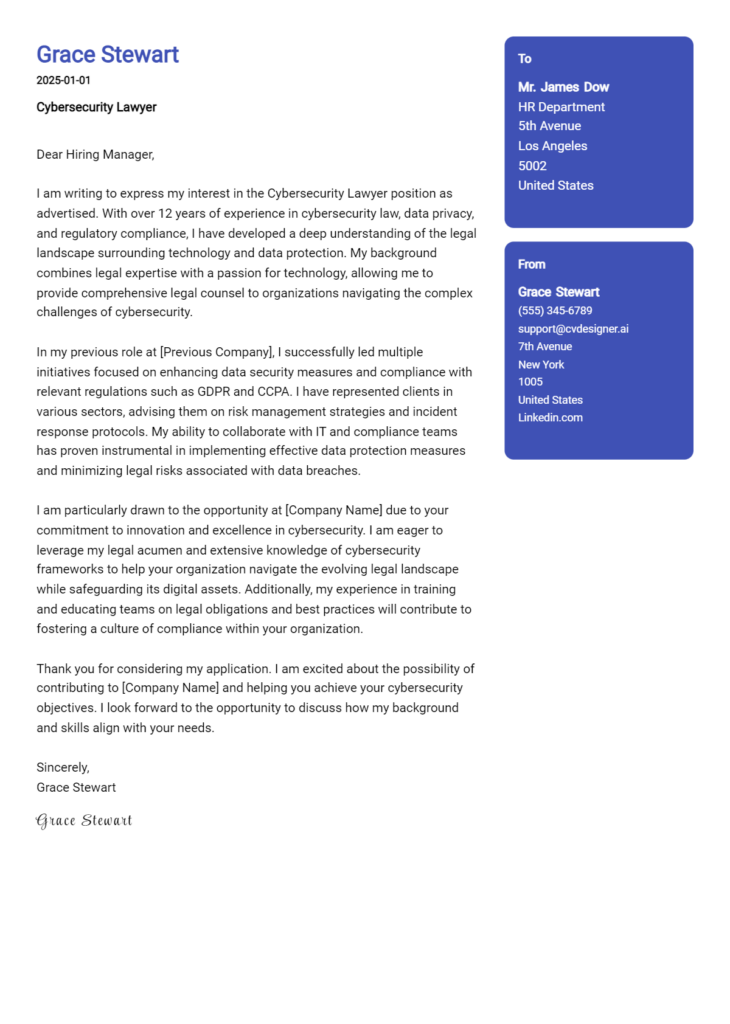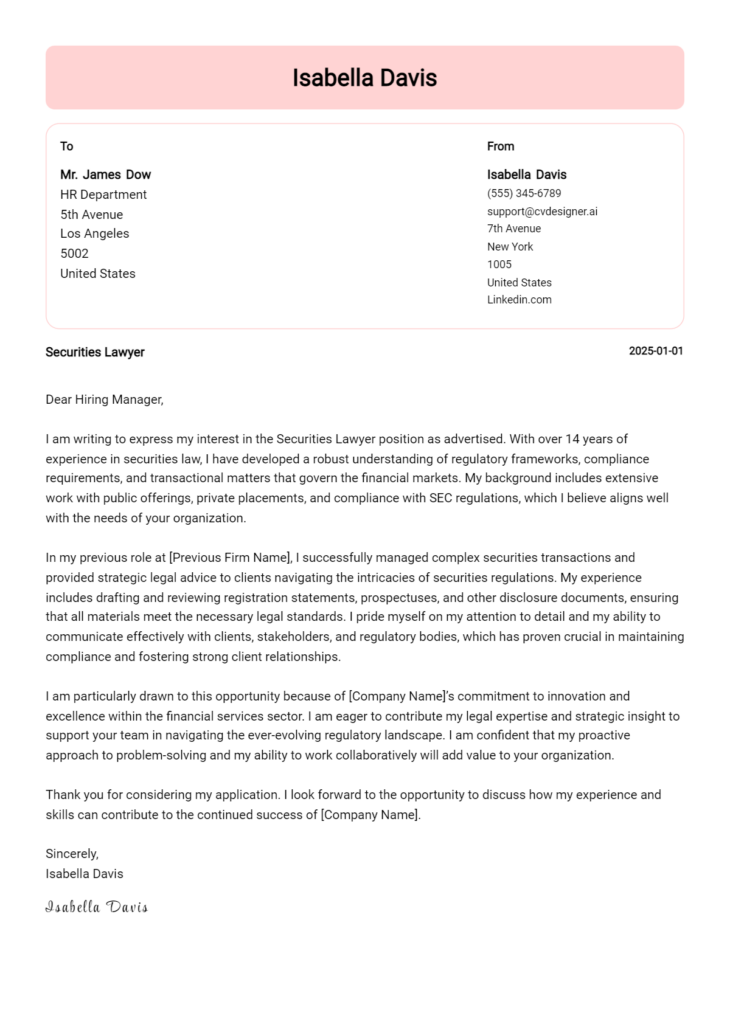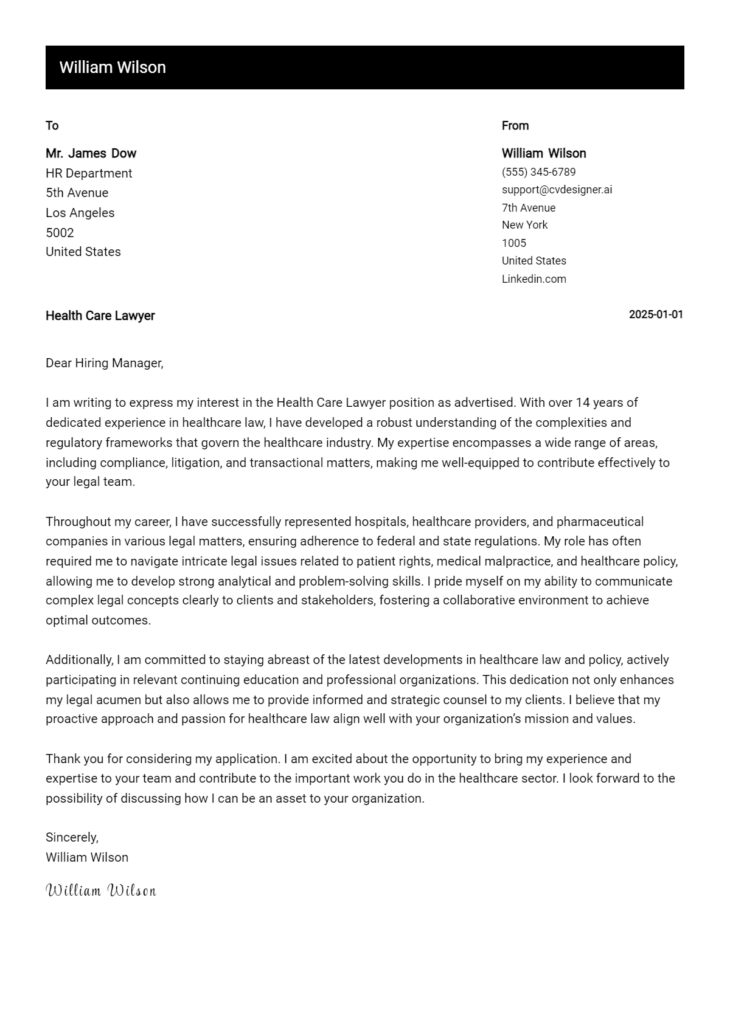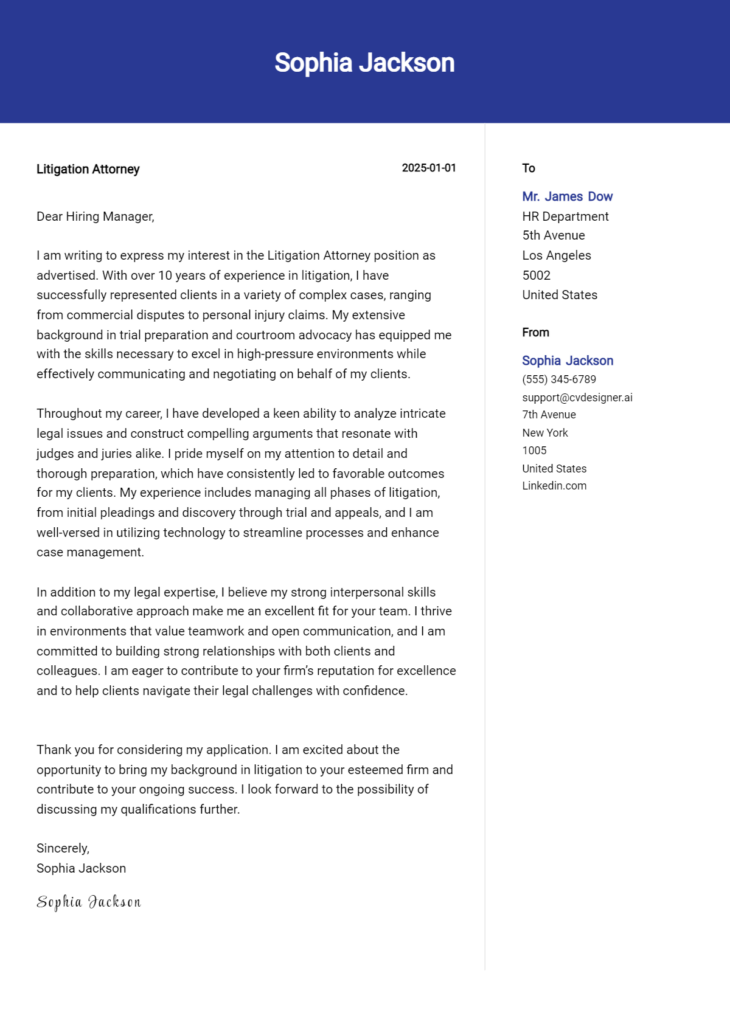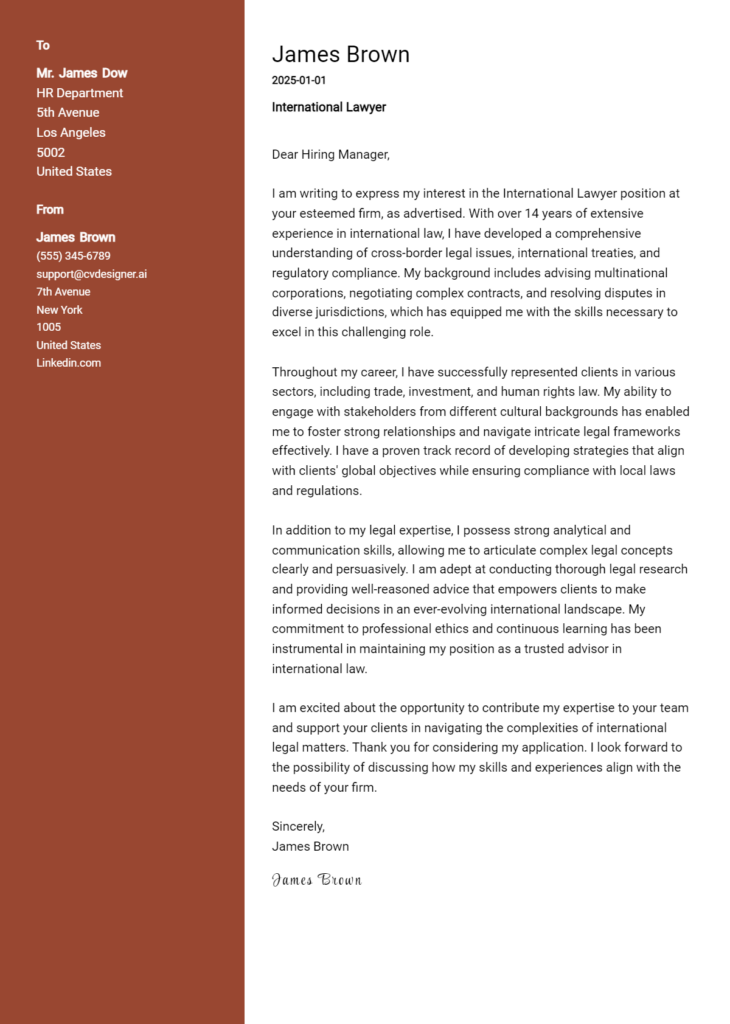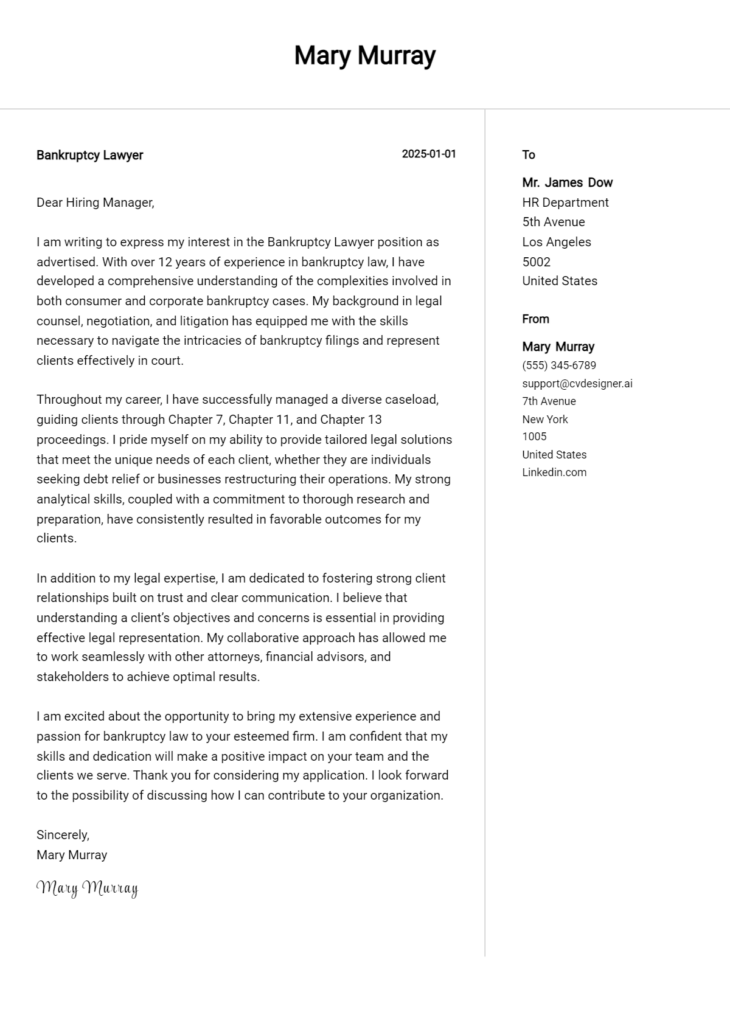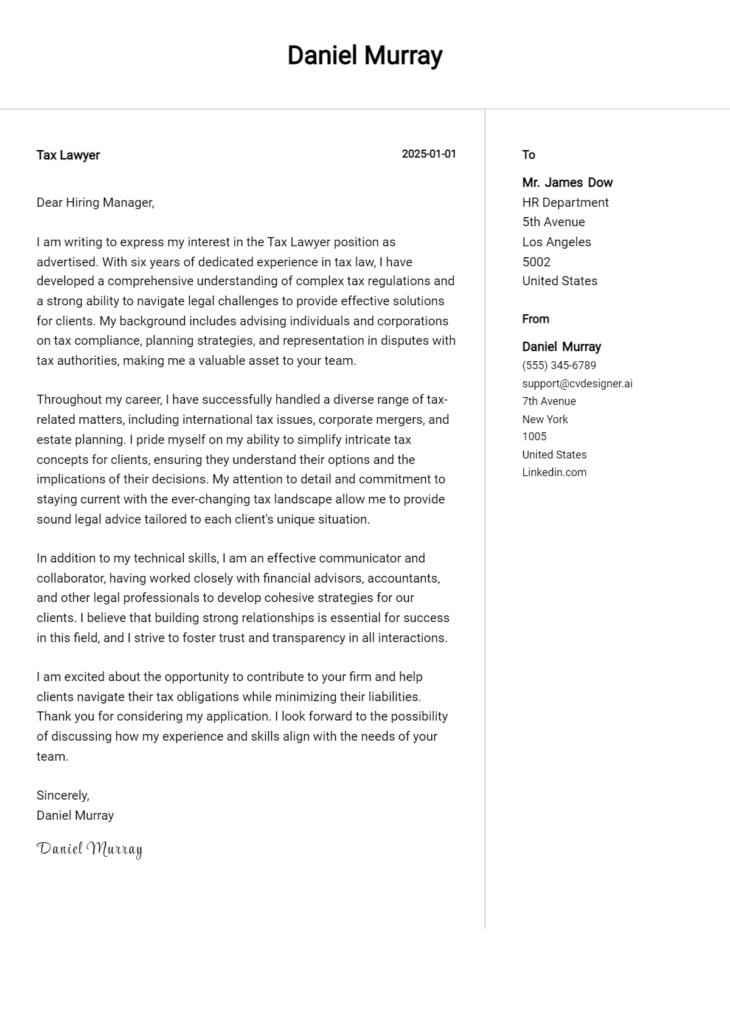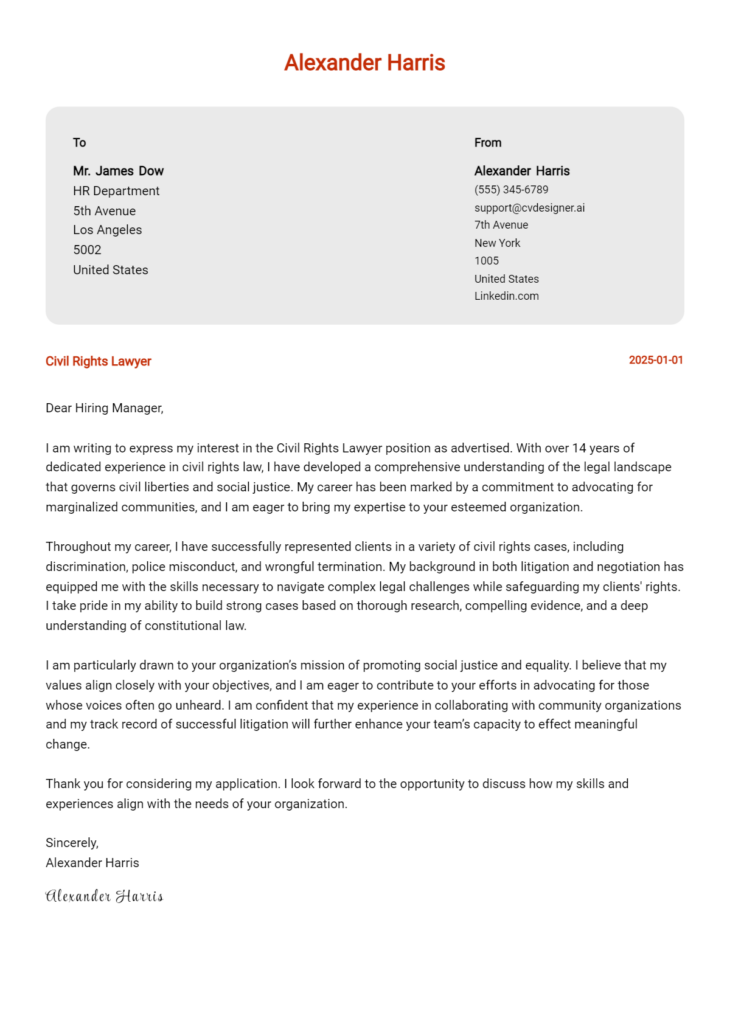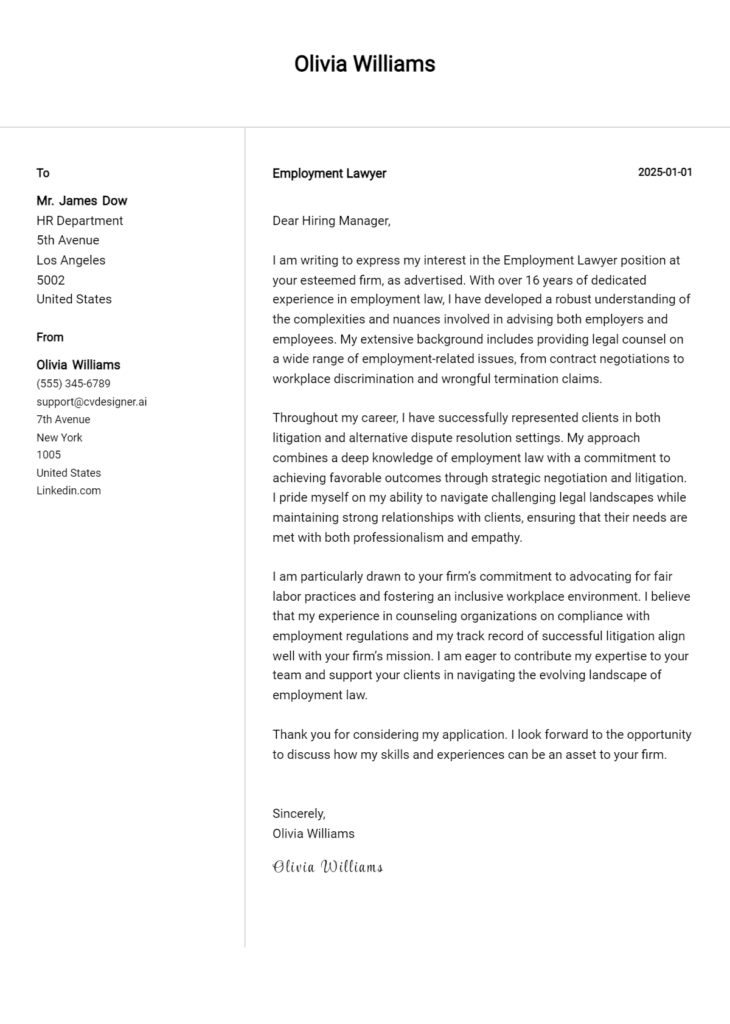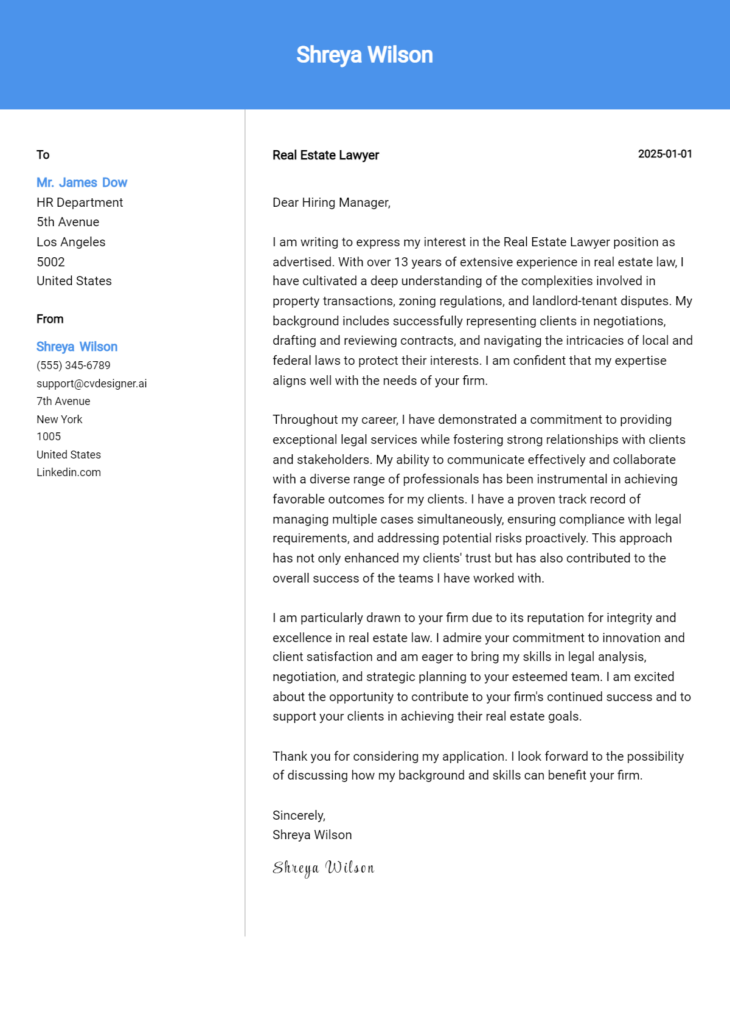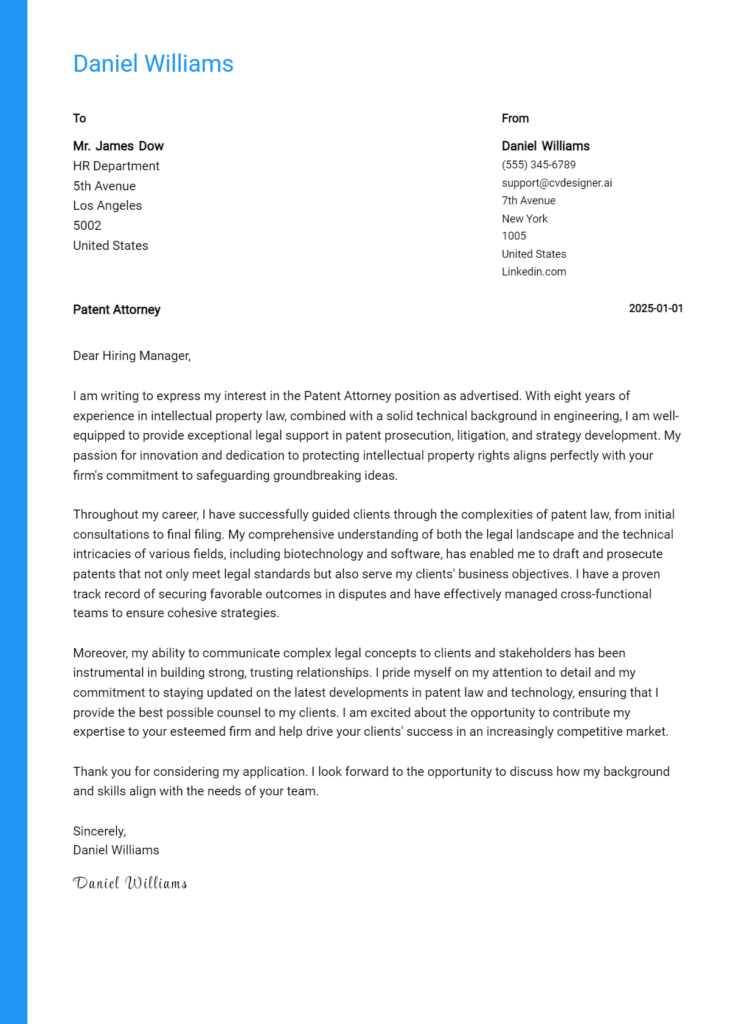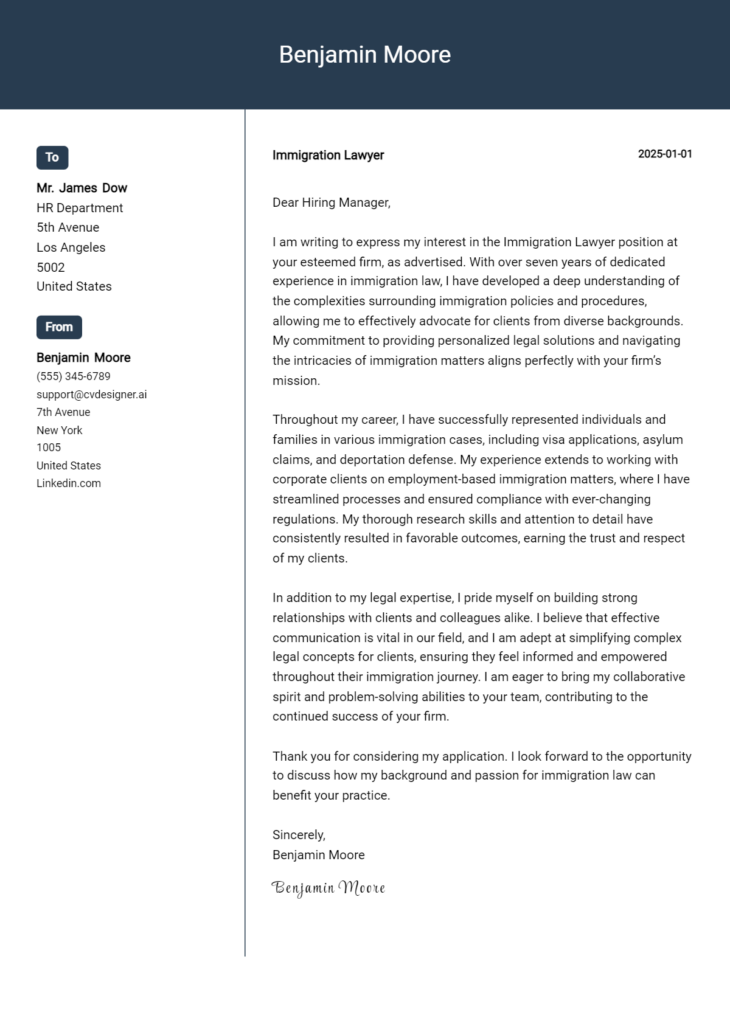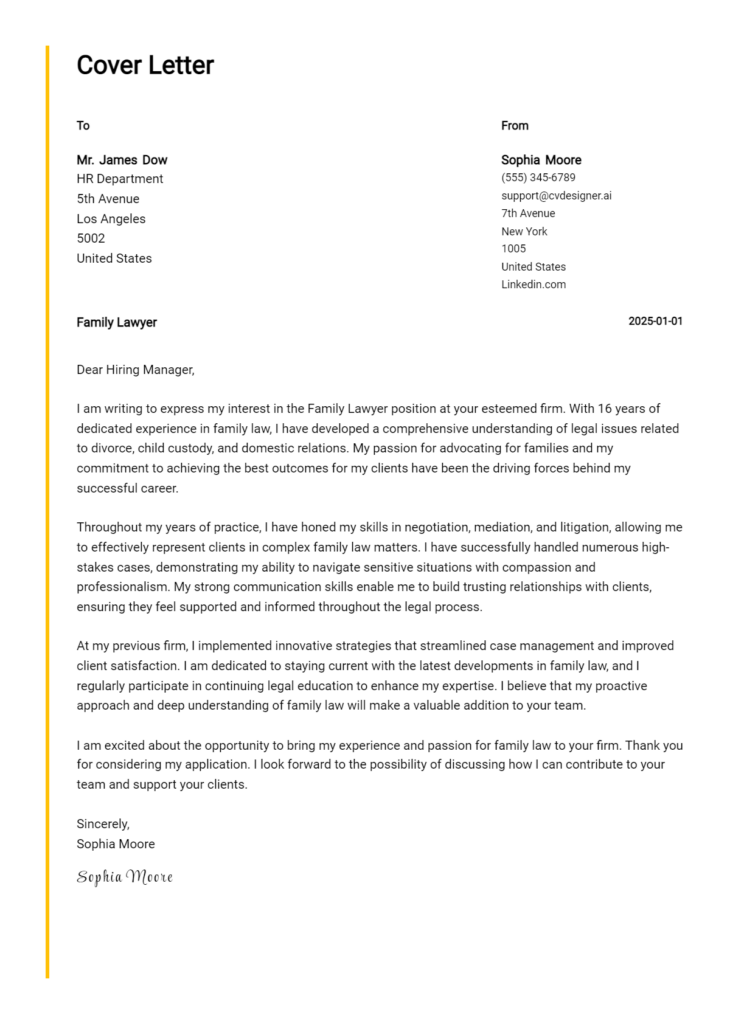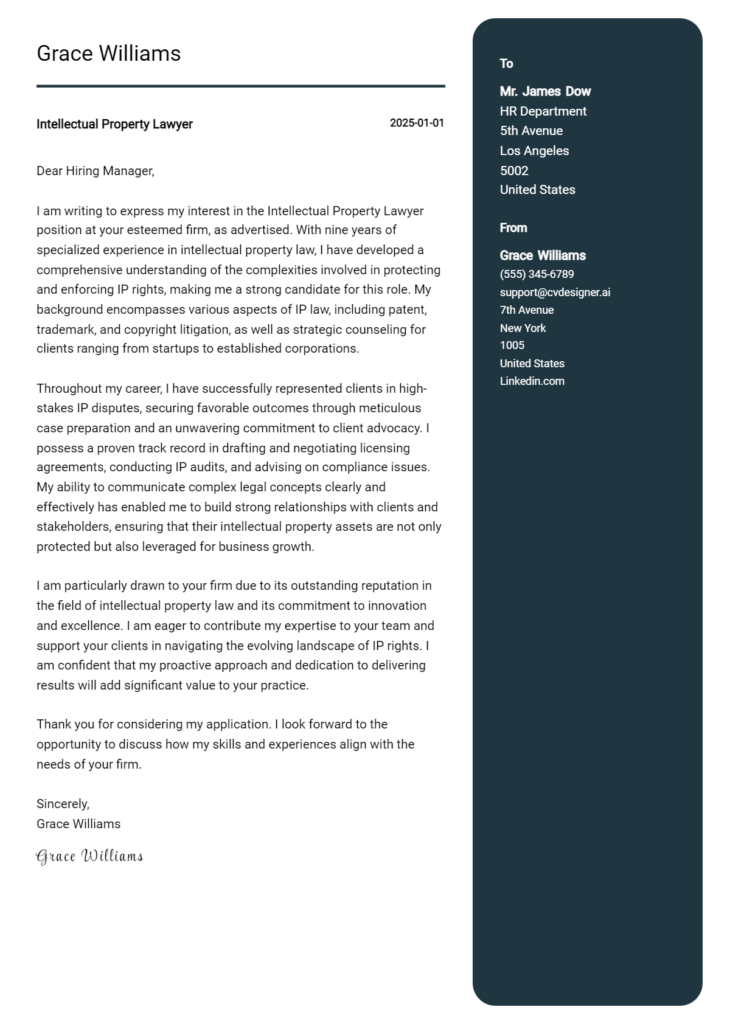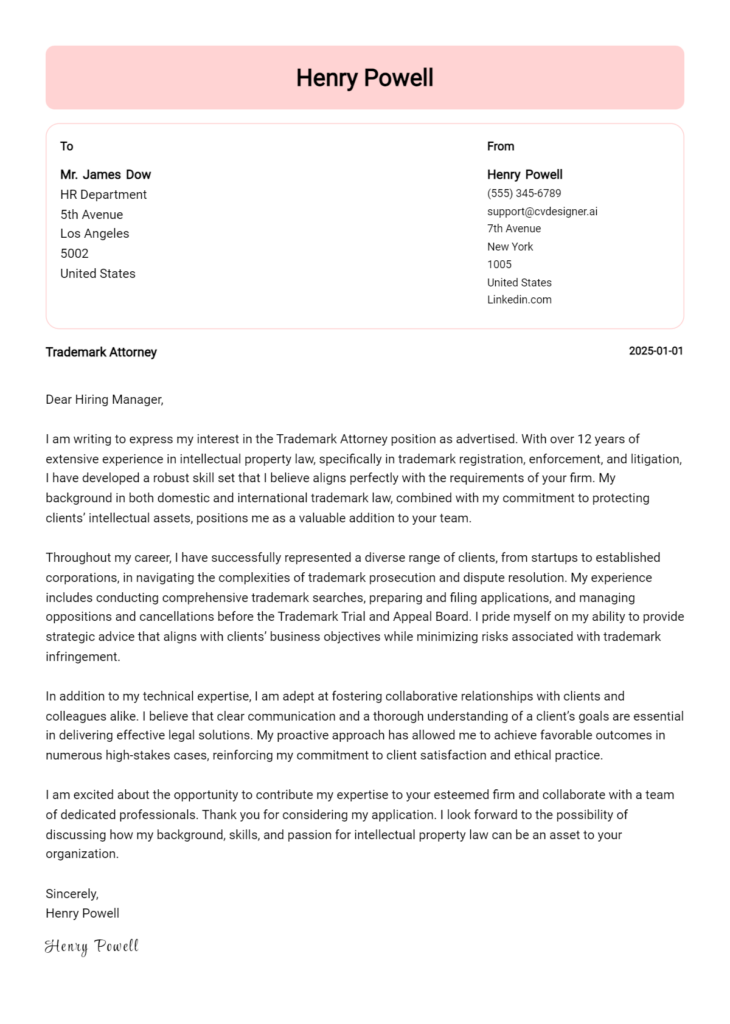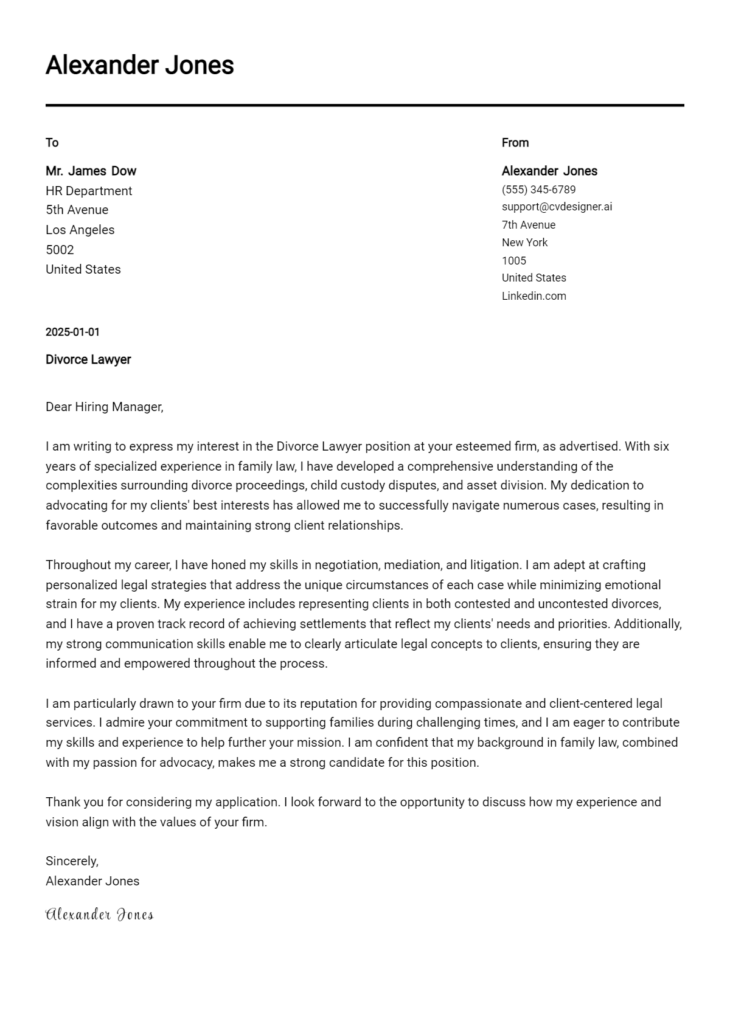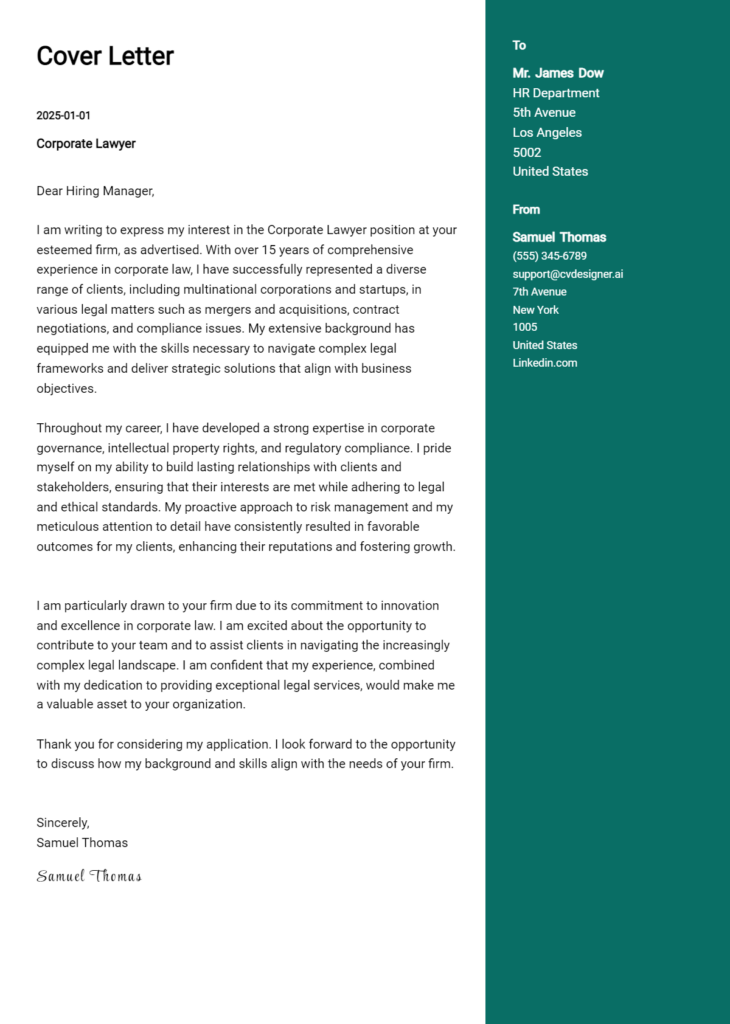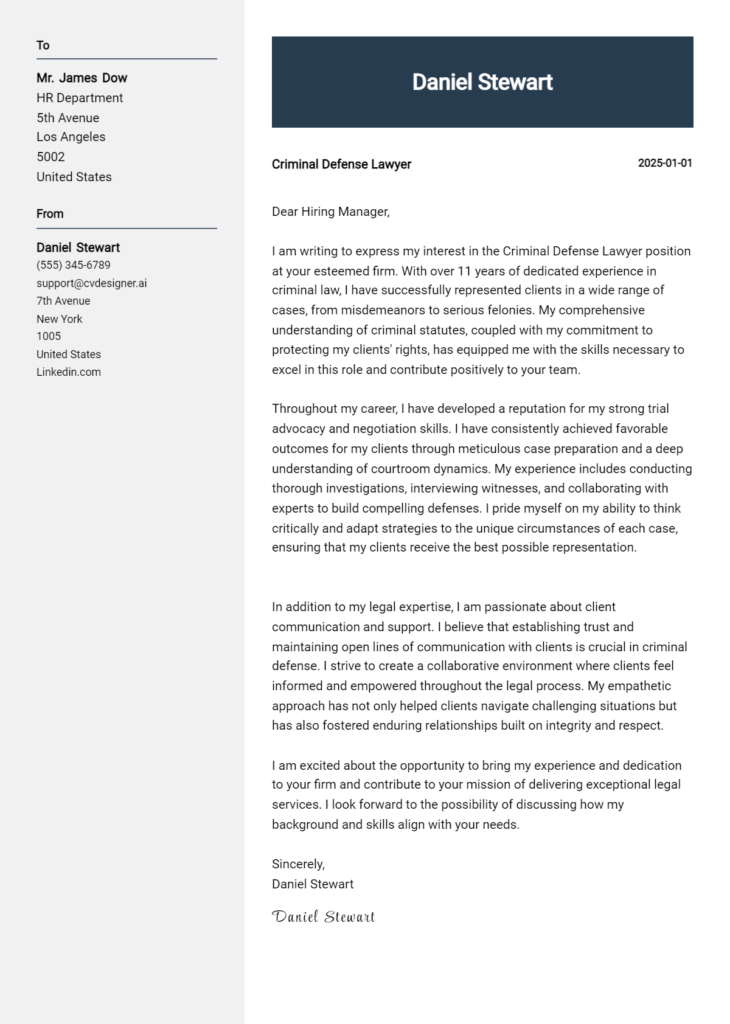Personal Injury Lawyer Cover Letter Examples
Explore additional Personal Injury Lawyer cover letter samples and guides and see what works for your level of experience or role.
How to Format a Personal Injury Lawyer Cover Letter?
Crafting a compelling cover letter is essential for a Personal Injury Lawyer, as it serves as your first impression to potential employers. Just like in legal practice, how you present your arguments and case details reflects your professionalism and attention to detail. A well-structured cover letter not only captures the hiring manager's attention but also demonstrates your ability to communicate effectively—an essential skill in the legal field.
In this guide, we will explore how to format your cover letter, focusing on the key components that will help you highlight your qualifications and showcase your expertise in personal injury law.
We will cover the following essential sections of a professional cover letter:
- Cover Letter Header
- Cover Letter Greeting
- Cover Letter Introduction
- Cover Letter Body
- Cover Letter Closing
Each section plays a critical role in making your application stand out in a competitive job market. Let’s delve into the specifics of each part to ensure your cover letter reflects your capabilities as a Personal Injury Lawyer.
Importance of the Cover Letter Header for a Personal Injury Lawyer
A well-structured cover letter header is crucial for a Personal Injury Lawyer as it sets the tone for the application and establishes professionalism. The header should include your contact information, the date, and the recipient's details. This clarity not only helps in easy communication but also demonstrates attention to detail, which is essential in the legal profession. A strong header conveys organization and seriousness about the position, while a weak one may create confusion or diminish the applicant's credibility.
Strong Example:
Jane Doe 123 Legal Lane Lawtown, ST 12345 (123) 456-7890 jane.doe@email.com October 10, 2023 Mr. John Smith Hiring Manager Law Firm of Excellence 456 Justice Drive Lawtown, ST 12345
Weak Example:
Jane D. Email: jane.doe@email.com 10/10/23 To Whom It May Concern,
Importance of the Cover Letter Greeting for a Personal Injury Lawyer
The greeting of your cover letter is crucial as it sets the tone for the rest of your application. A well-crafted greeting demonstrates professionalism and shows that you’ve taken the time to personalize your communication. Addressing the hiring manager directly can create an immediate connection and signals your genuine interest in the position. To make the best impression, avoid generic greetings such as "To Whom It May Concern." Instead, invest time in researching the recipient's name or title. This small effort can significantly enhance the effectiveness of your cover letter.
Strong Greeting Example
Dear Ms. Johnson,
Weak Greeting Example
To Whom It May Concern,
The Importance of a Cover Letter Introduction for a Personal Injury Lawyer
A well-crafted cover letter introduction is crucial for a Personal Injury Lawyer as it sets the tone for the entire application. This opening paragraph not only captures the hiring manager's attention but also conveys the candidate’s enthusiasm for the role. By briefly showcasing key skills or notable achievements, the introduction can significantly influence the hiring manager's perception of the candidate. A strong introduction can create a memorable first impression, while a weak one may lead to the application being overlooked. Below are examples of both strong and weak cover letter introductions for a Personal Injury Lawyer position.
Strong Example
Dear [Hiring Manager's Name], As a dedicated Personal Injury Lawyer with over eight years of experience advocating for clients in complex legal matters, I am excited to apply for the Personal Injury Lawyer position at [Company Name]. My proven track record of securing favorable settlements, combined with my passion for helping individuals seek justice, has equipped me with the skills necessary to effectively represent your clients. I am particularly impressed by [Company Name]'s commitment to client satisfaction and innovative legal strategies, and I am eager to contribute to your team’s success.
Weak Example
To Whom It May Concern, I am writing to apply for the Personal Injury Lawyer job you posted. I have some experience in the field and think I would be a good fit. I’ve worked on a few cases and have a law degree. I hope to hear back from you soon.
Purpose of the Cover Letter Body for a Personal Injury Lawyer
The cover letter body for a Personal Injury Lawyer serves as a critical platform for candidates to articulate their unique qualifications and experiences that align with the demands of the role. This section should effectively highlight specific skills such as negotiation, litigation, and client advocacy, along with notable accomplishments that demonstrate the candidate's ability to secure favorable outcomes for clients. By detailing relevant projects, such as successful case resolutions or innovative strategies used during trials, candidates can convey their value to the firm and showcase their potential contributions.
Strong Example
I have successfully represented over 150 clients in personal injury cases, achieving a 90% success rate in settlements. One of my most notable cases involved negotiating a $2 million settlement for a client who suffered a severe injury due to a negligence incident. My ability to meticulously gather evidence and coordinate with expert witnesses was instrumental in demonstrating liability and securing compensation. Additionally, I implemented a new case management system at my previous firm that improved document retrieval times by 40%, enhancing our overall efficiency and client satisfaction.
Weak Example
I have worked as a personal injury lawyer for several years and have handled various cases. I believe I am a good fit for this position because I am dedicated and hardworking. In my previous job, I did some legal work and attended court hearings. I hope to bring my experience to your firm and help clients with their injury cases.
Importance of Cover Letter Closing for a Personal Injury Lawyer
The closing paragraph of a cover letter for a Personal Injury Lawyer is crucial as it serves as the final opportunity to make a strong impression. It should summarize your qualifications, reiterate your enthusiasm for the role, and encourage the employer to take the next steps, such as reviewing your resume or scheduling an interview. A well-crafted closing can leave a lasting impact, while a weak closing may diminish the overall effectiveness of your application.
Strong Example
Thank you for considering my application for the Personal Injury Lawyer position at [Company Name]. With my extensive experience in litigating personal injury cases and my commitment to advocating for clients' rights, I am excited about the opportunity to contribute to your esteemed firm. I look forward to the possibility of discussing how my skills and passion align with your team's goals. Please feel free to review my attached resume, and I hope to schedule an interview soon to further discuss my candidacy.
Weak Example
I hope you like my application for the Personal Injury Lawyer job. I think it would be cool to work with you. If you want to talk more, you can look at my resume. Thanks for reading this.
When applying for a Personal Injury Lawyer position, crafting an effective cover letter is essential to stand out in a competitive field. Your cover letter should not only reflect your legal expertise but also highlight your technical skills, problem-solving abilities, understanding of the legal process, teamwork, and a commitment to continuous learning. The following tips will guide you in creating a compelling cover letter that showcases your qualifications and passion for personal injury law.
Tips for Writing an Effective Cover Letter for Personal Injury Lawyer
Highlight Your Technical Skills
Emphasize your legal knowledge and technical skills relevant to personal injury law. Mention your experience with case law, statutes, and regulations. Additionally, if you have familiarity with legal software or research tools, be sure to include that. This will demonstrate your technical proficiency and readiness to tackle complex cases.Showcase Problem-Solving Abilities
Personal injury law often involves navigating challenging situations. Use your cover letter to provide examples of how you've successfully resolved disputes or negotiated settlements. Discuss your analytical skills and your ability to think critically under pressure, which are essential for effectively advocating for clients.Demonstrate Your Understanding of the Legal Process
Include insights into your knowledge of the litigation process, from initial case assessment to trial preparation. This could involve discussing your experience in drafting pleadings, conducting depositions, or collaborating with expert witnesses. Show that you are well-versed in the entire SDLC (Software Development Life Cycle) of legal cases, which can set you apart from other candidates.Emphasize Teamwork and Collaboration
The legal field often requires working with a team of attorneys, paralegals, and support staff. Highlight your ability to collaborate effectively, share insights, and contribute positively to a team environment. Provide examples of successful team projects or cases where your collaborative efforts resulted in favorable outcomes for clients.Express a Passion for Continuous Learning
The legal landscape is ever-evolving, especially in personal injury law. Convey your commitment to professional development by mentioning any relevant courses, certifications, or seminars you've attended. Discuss how staying updated on legal trends and changes in regulations enhances your practice and benefits your clients.
By incorporating these tips into your cover letter, you can create a strong impression that resonates with hiring managers. For additional assistance, consider using cover letter templates or a cover letter builder to streamline your writing process and ensure your application stands out.
Common Mistakes to Avoid in a Personal Injury Lawyer Cover Letter
Crafting a compelling cover letter is essential for standing out in the competitive field of personal injury law. Avoiding common mistakes can significantly enhance your chances of securing an interview. Here are some pitfalls to watch out for:
Generic Opening: Using a vague salutation can make your cover letter feel impersonal. Instead, address the letter to a specific person when possible, showing that you’ve done your research.
Lack of Specificity: Failing to mention particular cases or experiences relevant to personal injury law can weaken your application. Highlight specific examples that showcase your expertise and passion for the field.
Overly Formal Language: While professionalism is key, overly formal language can come off as stiff. Aim for a conversational tone that still maintains professionalism.
Neglecting to Proofread: Spelling and grammatical errors can undermine your credibility as a lawyer. Always proofread your letter or have a colleague review it for errors.
Not Tailoring Your Letter: Sending out a one-size-fits-all cover letter can be detrimental. Customize your letter to reflect the values and needs of the law firm you are applying to.
Ignoring the Format: A cluttered or inconsistent layout can detract from your message. Follow a clear cover letter format to ensure readability.
Failing to Include a Call to Action: Concluding your letter without a call to action can leave your intent unclear. End with a strong statement expressing your desire for an interview or further discussion.
For more guidance, consider reviewing cover letter examples to inspire your writing process.
Cover Letter FAQs for Personal Injury Lawyer
What should I include in my cover letter as a Personal Injury Lawyer?
Your cover letter should include a concise introduction, a summary of your relevant experience, and a demonstration of your passion for personal injury law. Start with a compelling opening that highlights your motivation for applying. Discuss your experience with case management, client communication, and trial preparation. Be sure to mention any successful outcomes you've achieved, such as settlements or verdicts. Additionally, showcase your understanding of the specific laws and regulations in your jurisdiction. Finally, express your enthusiasm for the position and the firm, and conclude with a call to action, inviting them to review your resume or schedule an interview.
How can I tailor my cover letter for a specific personal injury law firm?
Tailoring your cover letter involves researching the law firm and understanding its values, specialties, and culture. Start by reviewing the firm’s website, focusing on their mission statement, recent cases, and any notable achievements. Reference specific cases or initiatives that resonate with you and align with your professional experience. Highlight any skills or experiences that directly relate to the firm's focus areas, such as medical malpractice, workers' compensation, or product liability. Additionally, use a tone that reflects the firm’s culture—professional yet approachable. This personal touch demonstrates your genuine interest and shows that you've taken the time to learn about the firm.
How long should my cover letter be as a Personal Injury Lawyer?
Your cover letter should be concise, ideally one page in length, with a focus on clarity and relevance. Aim for three to four paragraphs that cover your introduction, qualifications, and closing statement. Each paragraph should contain clear and direct language to communicate your skills and experiences without overwhelming the reader with unnecessary details. Use bullet points or lists to highlight key achievements or qualifications if appropriate. Remember that hiring managers often skim cover letters, so it’s important to make your points clear and impactful. This brevity ensures that you maintain their attention and leave a strong impression.
Should I mention my salary expectations in my cover letter?
Generally, it is advisable to avoid mentioning salary expectations in your cover letter unless specifically requested in the job posting. Instead, focus on highlighting your qualifications and the value you bring to the law firm. Discuss your experience, accomplishments, and commitment to the field, which can help justify your desired salary during later stages of the hiring process. If a salary range is explicitly requested in the application, provide a reasonable range based on your research of industry standards and your level of experience. This approach allows you to keep the focus on your professional abilities while leaving room for negotiation.
Build your Cover Letter in minutes
Use an AI-powered cover letter builder and have your letter done in 5 minutes. Just select your template and our software will guide you through the process.

